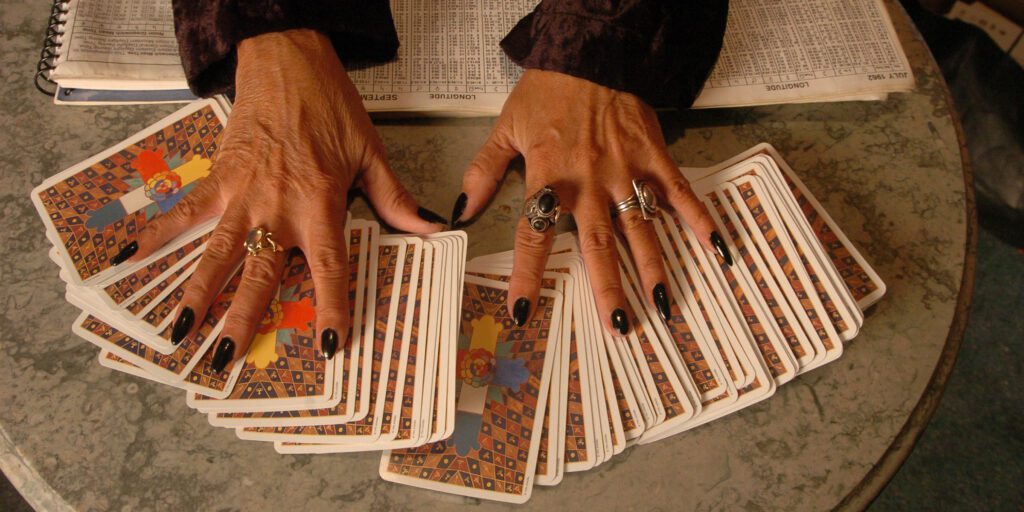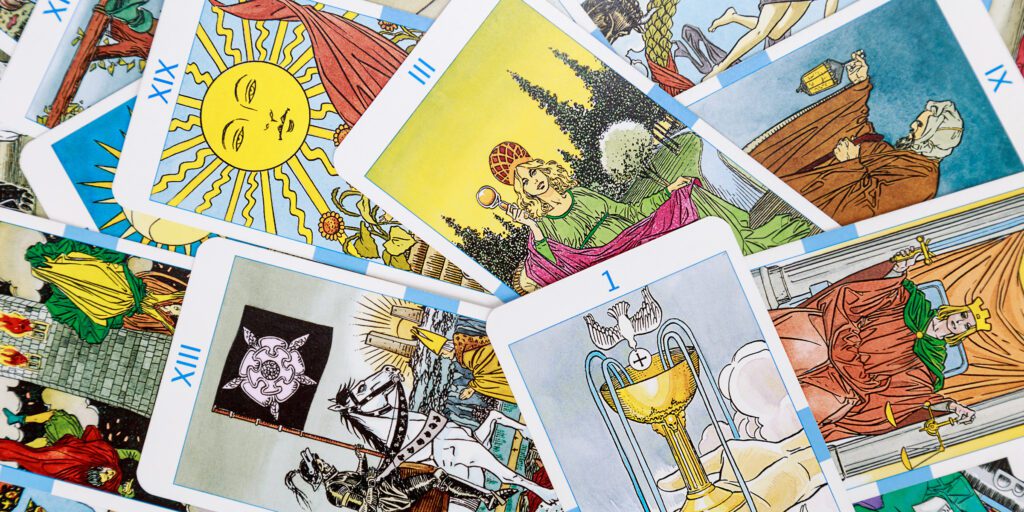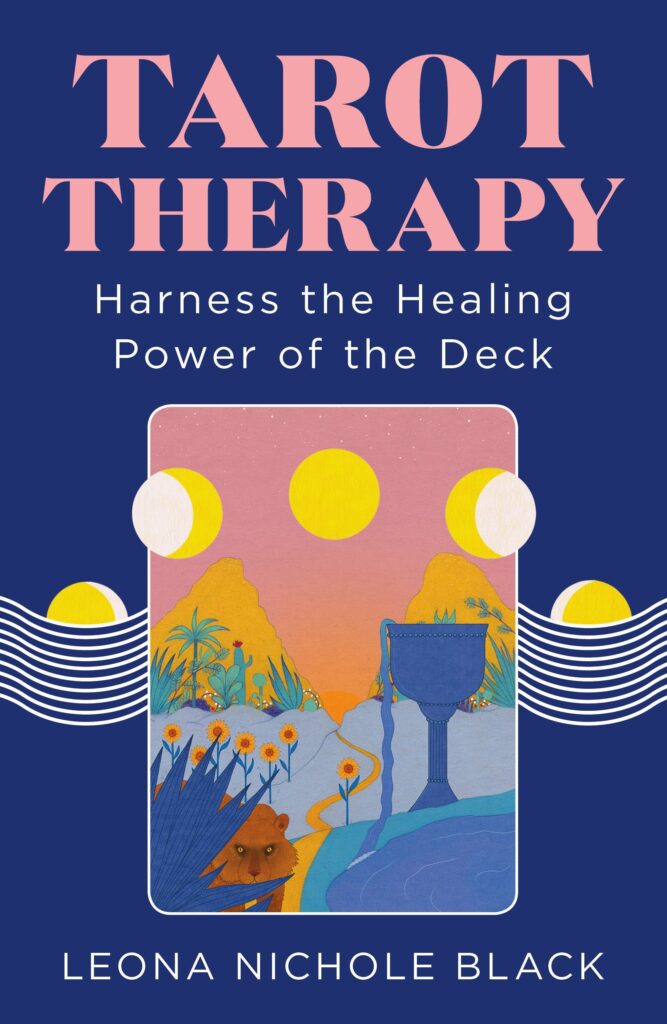In the world of alternative healing and self-reflection, tarot therapy has gained significant popularity. Tarot cards, often associated with fortune-telling, offer much more than just divination. This article explores the concept of tarot therapy, shedding light on its purpose, benefits, and how it can provide guidance on your personal journey of self-discovery and growth. Discover the transformative power of tarot cards and unlock a deeper understanding of your emotions, relationships, and life path. Embark on a fascinating exploration of tarot therapy and learn how it can bring clarity and empowerment into your life.
What is tarot therapy?
Definition and overview
Tarot therapy is a form of counseling that utilizes tarot cards as a tool for self-reflection, insight, and personal growth. It combines the principles of traditional therapy with the symbolic language of tarot to provide guidance, support, and healing.
Tarot cards are a deck of 78 cards, each with their own unique imagery and symbolism. These cards are used to stimulate the client’s intuition and access their subconscious mind. The reader interprets the cards using their knowledge of tarot symbolism, and together with the client, they explore the themes and messages that arise during the reading.
Historical background
The use of tarot cards dates back to the 15th century in Europe. Originally, tarot cards were used for divination and fortune-telling. However, in recent years, the therapeutic benefits of tarot have been recognized and utilized in a therapeutic setting.
The use of tarot cards in therapy
In tarot therapy, the tarot cards serve as a catalyst for self-exploration and personal growth. They provide a visual representation of the client’s thoughts, feelings, and subconscious patterns. The therapist guides the client through a tarot reading, helping them to explore their emotions, gain insights into their challenges, and discover potential solutions.
Tarot cards are not used to predict the future or provide definitive answers. Instead, they act as a mirror, reflecting the client’s inner world back to them. Through this process, clients gain a deeper understanding of themselves, their relationships, and their life circumstances.
How tarot therapy works
Tarot therapy works by tapping into the client’s intuition and accessing their subconscious mind. During a tarot reading, the client selects a certain number of cards from the deck. The chosen cards are then laid out in a specific pattern, known as a spread.
Each card in the spread represents a different aspect of the client’s life and inner self. The therapist guides the client in interpreting the cards, exploring their meanings, and discussing their relevance to the client’s current situation.
Through the process of discussing and reflecting on the cards, the client gains insights into their emotions, beliefs, and behaviors. This newfound awareness empowers the client to make positive changes in their life, find solutions to their challenges, and gain a sense of clarity and direction.
Benefits of tarot therapy
Self-reflection and insight
One of the primary benefits of tarot therapy is the opportunity for self-reflection and gaining insight into one’s own thoughts, feelings, and behaviors. By exploring the symbolism and messages of the tarot cards, clients are encouraged to delve deep into their own psyche and discover hidden aspects of themselves.
Tarot therapy helps individuals to gain a fresh perspective on their life circumstances and challenges. It allows them to step back and see the bigger picture, enabling them to make more informed decisions and take actions that align with their values and goals.
Enhancing intuition and self-awareness
Tarot therapy can help individuals develop and trust their own intuition. By engaging with the imagery and symbolism of the tarot cards, clients learn to tap into their inner wisdom and make decisions based on their own inner knowing.
Furthermore, tarot therapy promotes self-awareness. Through the process of exploring the tarot cards and discussing their meanings, clients gain a deeper understanding of their own emotions, beliefs, and patterns of behavior. This self-awareness is essential for personal growth and making positive changes in life.
Promoting mental and emotional healing
Tarot therapy has the potential to promote mental and emotional healing. By providing a safe and supportive space for clients to explore their feelings and experiences, tarot therapy allows for the processing and release of emotions.
The symbolic language of the tarot cards can serve as a powerful tool for healing. The images and messages of the cards can evoke deep emotional responses, allowing clients to gain insight into the root causes of their pain and develop strategies for healing and growth.
Developing problem-solving skills
Tarot therapy can help individuals develop problem-solving skills. The process of analyzing and interpreting the tarot cards encourages clients to approach their challenges from different perspectives and consider alternative solutions.
Tarot therapy also fosters creativity and resourcefulness. By exploring the symbolism of the cards, clients are encouraged to think outside the box and consider unconventional approaches to problem-solving. This can lead to innovative solutions and new insights into one’s own strengths and abilities.
Stress reduction and relaxation
Engaging in tarot therapy can be a relaxing and stress-reducing experience. The act of focusing on the cards, reflecting on their meanings, and discussing one’s thoughts and feelings can help individuals to calm their minds and find a sense of inner peace.
The process of engaging with the tarot cards can also act as a form of meditation. By immersing oneself in the imagery and symbolism of the cards, individuals can enter a state of heightened awareness and relaxation. This can help to alleviate stress, reduce anxiety, and promote overall well-being.

The role of a tarot therapist
Training and qualifications
Tarot therapists undergo specific training and acquire specialized knowledge and skills in order to effectively use tarot cards in a therapeutic setting. They may obtain certifications or degrees in counseling, psychology, or related fields. Additionally, they receive training in tarot symbolism, card interpretation, and therapeutic techniques.
Creating a safe and supportive environment
A crucial role of a tarot therapist is to create a safe and supportive environment for their clients. They provide a non-judgmental space where clients can freely express themselves, explore their emotions, and share their experiences.
A tarot therapist establishes rapport and trust with their clients, actively listening and validating their thoughts and feelings. They create a space for open dialogue and guide the client through the tarot reading process, ensuring that the client feels heard, understood, and supported.
Understanding and interpreting tarot symbolism
One of the key skills of a tarot therapist is the ability to understand and interpret tarot symbolism. They have a deep knowledge of the meanings and associations of each card, as well as the different spreads and layouts used during a tarot reading.
The tarot therapist is able to draw connections between the cards and the client’s life circumstances. They provide insight, guidance, and interpretations that help the client gain a richer understanding of themselves and their situation.
Guiding clients through tarot readings
A tarot therapist serves as a guide for their clients during a tarot reading. They facilitate a structured and focused exploration of the tarot cards, encouraging the client to reflect on their own thoughts and feelings.
The tarot therapist helps the client make connections between the cards and their own life experiences. They ask thought-provoking questions, encourage self-reflection, and provide support as the client navigates through the insights and messages revealed by the tarot cards.
Empowering clients to find their own answers
Ultimately, the role of a tarot therapist is to empower their clients. Rather than providing definitive answers or solutions, the therapist encourages the client to find their own answers within the tarot cards.
A tarot therapist helps their clients develop their own intuition and inner wisdom. They support the client in exploring different perspectives and possibilities, guiding them towards making decisions that align with their values and goals. The therapist believes in the client’s capacity for growth and personal transformation.
Tarot therapy techniques
Card readings and interpretation
The core technique of tarot therapy is the card reading and interpretation. The client selects a specific number of cards from the deck, and the therapist guides them in interpreting the meanings and messages of the chosen cards.
Different spreads and layouts can be used to focus the reading on specific areas of the client’s life or to explore different aspects of a particular issue. The tarot therapist uses their knowledge of tarot symbolism, card meanings, and intuition to provide insight and guidance to the client.
Journaling and reflection
Tarot therapy often incorporates journaling and reflection as a complementary practice to the card reading. After the tarot reading, the client is encouraged to journal about their thoughts, feelings, and insights that arose during the session.
Journaling allows the client to further process and integrate the messages and symbolism of the tarot cards. It provides a space for deeper self-reflection, exploration of emotions, and clarification of thoughts. The tarot therapist may provide prompts or suggestions to guide the journaling process.
Visualization and meditation
Visualization and meditation are commonly used in tarot therapy to deepen the client’s connection with the tarot cards and access their subconscious mind. The client may be guided by the therapist in visualizing themselves within the imagery of the tarot cards or using the cards to inspire meditation.
Visualization and meditation can help the client to access their intuition, gain clarity, and experience a sense of calm and relaxation. These techniques can be particularly helpful in exploring difficult emotions, releasing stress, and cultivating a positive mindset.
Affirmations and positive reinforcement
Tarot therapy often incorporates affirmations and positive reinforcement as a means of supporting the client’s personal growth and transformation. Through the process of interpreting the tarot cards, the therapist identifies positive aspects, strengths, and opportunities for the client.
The therapist encourages the client to focus on these positive aspects and affirms their potential for growth and change. Affirmations are personalized statements that reinforce the client’s strengths and values, and they are used to counteract negative self-talk and promote self-empowerment.
Intuitive counseling and discussion
In addition to the card reading and interpretation, tarot therapy involves intuitive counseling and discussion. The therapist engages in open and exploratory dialogue with the client, allowing them to share their thoughts, feelings, and insights that arise during the reading.
The therapist asks probing questions, encourages the client to express themselves, and helps them make connections between the symbolism of the tarot cards and their personal experiences. Through this process, the client gains a deeper understanding of themselves and their life circumstances, and the therapist provides guidance and support.

Tarot therapy vs. traditional therapy
Complementary or alternative approach
Tarot therapy can be seen as a complementary or alternative approach to traditional therapy. It offers a unique perspective and a different set of tools for self-exploration and personal growth.
While traditional therapy focuses primarily on verbal communication and psychological theories, tarot therapy incorporates visual imagery and symbolism. It taps into the client’s intuition and encourages the exploration of their subconscious mind. Both approaches can be beneficial, and individuals may choose one or the other based on their personal preferences and needs.
Focus on spiritual and intuitive aspects
One of the key differences between tarot therapy and traditional therapy is the emphasis on spiritual and intuitive aspects. Tarot therapy recognizes that individuals have an innate wisdom and inner knowing that can guide their personal growth and decision-making.
Tarot cards serve as a bridge between the conscious and subconscious mind, facilitating access to this inner wisdom. The spiritual and intuitive aspects of tarot therapy can provide a sense of meaning and connection for individuals who are open to exploring these dimensions of their lives.
Integration of symbolism and archetypes
Tarot therapy integrates symbolism and archetypes into the therapeutic process. The imagery and symbolism of the tarot cards represent universal themes and experiences that resonate with the human psyche.
By engaging with these archetypal symbols, clients can access collective wisdom and gain insight into their own personal journey. The use of symbolism and archetypes allows for a deeper exploration of the subconscious mind and can help clients uncover patterns and themes that influence their thoughts, behaviors, and emotions.
Potential limitations and controversies
Tarot therapy, like any therapeutic approach, has potential limitations and controversies. Skeptics argue that tarot therapy lacks scientific evidence and relies on subjective interpretation. They question the validity and reliability of using tarot cards as a therapeutic tool.
It is important to note that tarot therapy should not replace professional medical or mental health treatment. Tarot therapists are not trained to diagnose or treat mental health disorders. Instead, tarot therapy should be viewed as a complementary practice that can enhance personal growth and self-awareness.
Research and evidence supporting tarot therapy
Anecdotal evidence and personal testimonials
While there is limited scientific research on tarot therapy, there is anecdotal evidence and personal testimonials that suggest its potential benefits. Many individuals report positive outcomes from engaging in tarot therapy, such as increased self-awareness, improved decision-making, and enhanced emotional well-being.
Anecdotal evidence cannot be considered definitive proof of the effectiveness of tarot therapy, but it does provide valuable insights into the experiences of those who have found it beneficial. Further research is needed to explore the underlying mechanisms and outcomes of tarot therapy in a more systematic and rigorous manner.
Exploring the placebo effect
The placebo effect is a phenomenon in which a person experiences a perceived improvement in their condition or well-being due to the belief in a treatment, even if the treatment itself is inactive or lacks evidence-based efficacy.
Tarot therapy may invoke the placebo effect, as individuals may experience psychological benefits simply by engaging in a therapeutic process and believing in the power of the tarot cards to guide their personal growth. Understanding the influence of the placebo effect is important when evaluating the effectiveness of tarot therapy.
Emerging studies and academic research
While the academic research on tarot therapy is still in its early stages, there are emerging studies that explore the potential benefits and mechanisms of tarot therapy.
Some research has focused on the psychological aspects of tarot therapy, such as its impact on self-awareness, decision-making, and emotional well-being. Other studies have examined the effects of the archetypal symbolism of the tarot cards on the therapeutic process.
While these studies provide valuable insights, further research is needed to establish a stronger evidence base for tarot therapy and to address methodological limitations, such as small sample sizes and lack of control groups.
Ethical considerations for research
When conducting research on tarot therapy, ethical considerations play a crucial role. Researchers must ensure that participants are adequately informed about the nature of the study, the potential risks and benefits, and their right to withdraw at any time.
Confidentiality and privacy are also essential ethical considerations, as participants may disclose personal and sensitive information during the course of the study. Researchers must take appropriate measures to protect the anonymity and confidentiality of the participants.

Who can benefit from tarot therapy?
Individuals seeking personal growth
Tarot therapy can benefit individuals who are seeking personal growth and self-improvement. By engaging with the symbolism of the tarot cards, individuals can gain insights into their own strengths, weaknesses, and areas for growth.
Tarot therapy encourages individuals to reflect on their thoughts, beliefs, and behaviors, and empowers them to make positive changes in their lives. It provides a framework for self-exploration and personal development, allowing individuals to better understand themselves and their life circumstances.
Those facing life transitions or difficult decisions
Tarot therapy can be particularly helpful for individuals who are facing life transitions or difficult decisions. The tarot cards can provide guidance and support during times of uncertainty and change.
By exploring the symbolism of the tarot cards, individuals can gain clarity and insight into their options and potential outcomes. Tarot therapy helps individuals approach their decisions with a deeper understanding of their own desires, values, and goals.
People dealing with emotional trauma or grief
Tarot therapy can be a valuable tool for individuals dealing with emotional trauma or grief. By engaging with the imagery and symbolism of the tarot cards, individuals can explore and process their emotions in a safe and supportive environment.
Tarot therapy allows individuals to gain insights into the root causes of their pain and develop strategies for healing and emotional well-being. It offers a space for individuals to express and honor their feelings, and provides a framework for navigating the grieving process.
Individuals seeking clarity and direction
Tarot therapy is often sought by individuals who are seeking clarity and direction in their lives. The symbolism and messages of the tarot cards can provide guidance and insights into one’s life purpose, goals, and aspirations.
By engaging in tarot therapy, individuals can gain a deeper understanding of themselves and their life circumstances. This newfound clarity and direction empowers individuals to make informed decisions, set meaningful goals, and take action towards creating a more fulfilling life.
Anyone interested in exploring their inner self
Tarot therapy is open to anyone who is interested in exploring their inner self and gaining a deeper understanding of their own thoughts, feelings, and behaviors. It is a versatile tool that can be used by individuals of all backgrounds and belief systems.
By engaging in tarot therapy, individuals embark on a journey of self-discovery and self-exploration. They may uncover hidden aspects of themselves, develop a stronger sense of self-awareness, and gain a deeper appreciation for their unique qualities and life experiences.
Finding a tarot therapist
Professional associations and certifications
When seeking a tarot therapist, it is important to consider their professional associations and certifications. Look for therapists who are members of recognized professional organizations that promote ethical and standards-based practice.
Such organizations may provide certifications or credentials in tarot therapy, ensuring that the therapist has undergone specific training and adheres to professional guidelines. The certifications may indicate that the therapist has demonstrated competence in tarot symbolism, card interpretation, and therapeutic techniques.
Seeking recommendations and referrals
Another way to find a tarot therapist is through recommendations and referrals from trusted sources. Reach out to friends, family, or colleagues who have had positive experiences with a tarot therapist and ask for their recommendations.
Additionally, online communities and forums focused on tarot or holistic healing may provide valuable insights and recommendations for tarot therapists. Consider the feedback and reviews from individuals who have worked with specific therapists to help inform your decision.
Researching therapist backgrounds and expertise
Before committing to a tarot therapist, it is important to research their backgrounds and expertise. Look for information about their training, education, certifications, and experience in tarot therapy.
Some therapists may have additional qualifications in related fields, such as counseling, psychology, or coaching. Consider the therapist’s areas of specialization and whether they align with your specific needs and goals.
Considering personal compatibility and comfort
When selecting a tarot therapist, personal compatibility and comfort are crucial factors to consider. Tarot therapy involves a deep level of personal exploration and vulnerability, so it is important to feel safe and supported by your therapist.
Consider scheduling an initial consultation or interview with potential therapists to get a sense of their approach, communication style, and rapport. Trust your intuition and choose a therapist with whom you feel comfortable sharing your thoughts, feelings, and experiences.

Personal responsibility and tarot therapy
The role of personal interpretation and belief
In tarot therapy, personal interpretation and belief play a significant role. The client’s interpretation of the tarot cards and their messages is an essential part of the therapeutic process.
Each individual brings their own unique perspectives, beliefs, and life experiences to the tarot reading. Tarot therapy encourages clients to trust their intuition and make meaning from the symbols and messages that resonate with them personally.
Balancing guidance from the cards and individual choice
While tarot cards can provide guidance and insight, it is important to balance the guidance from the cards with individual choice. Tarot therapy is not about passively accepting the messages of the cards as absolute truth, but rather using them as a tool for self-reflection and decision-making.
Clients are encouraged to consider the guidance of the tarot cards alongside their own values, beliefs, and goals. The ultimate responsibility for decisions and actions lies with the individual, and tarot therapy serves as a supportive framework for exploring possibilities and gaining clarity.
Recognizing the limitations of tarot therapy
Like any therapeutic approach, tarot therapy has its limitations. It is not a substitute for professional medical or mental health treatment. Tarot therapists are not trained to diagnose or treat mental health disorders, and individuals should seek appropriate professional help when needed.
Tarot therapy should be viewed as a complementary practice that can enhance personal growth and self-awareness. It is important to recognize that not all issues or challenges can be addressed solely through tarot therapy, and that other therapeutic modalities may be beneficial in conjunction with tarot therapy.
Maintaining a critical and open mindset
When engaging in tarot therapy, it is important to maintain a critical and open mindset. While tarot therapy has the potential for personal growth and self-discovery, it is essential to approach it with informed caution.
Be willing to question the interpretations and insights that arise during the tarot reading, and maintain a healthy skepticism. Explore different perspectives and possibilities, and consult with trusted professionals when in doubt.
Conclusion
Tarot therapy is a unique and powerful tool for self-reflection, personal growth, and healing. By engaging with the symbology of the tarot cards, individuals can gain insights into their own thoughts, feelings, and behaviors. Tarot therapy encourages self-awareness, enhances intuition, and provides guidance and support during life transitions and difficult decisions.
Finding a qualified tarot therapist who creates a safe and supportive environment is crucial. Consider their training, certifications, and personal compatibility before embarking on a tarot therapy journey.
While tarot therapy has potential benefits, it is important to recognize its limitations and maintain a critical and open mindset. Tarot therapy should complement, not replace, professional medical or mental health treatment.
Ultimately, tarot therapy offers a unique and holistic approach to self-reflection and personal growth. It empowers individuals to explore their inner selves, make informed decisions, and create meaningful and fulfilling lives.

